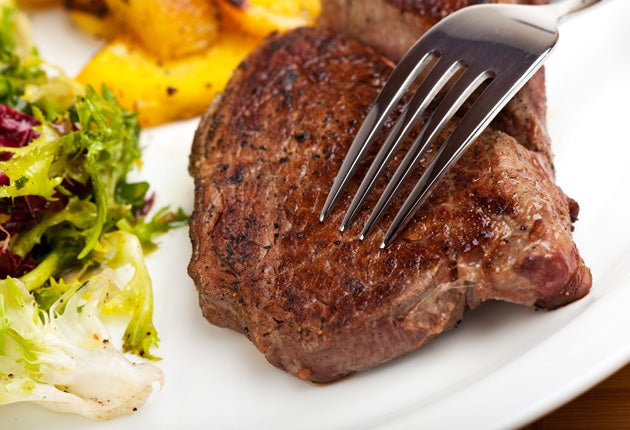Excessive meat-eating 'kills 45,000 each year'

Lowering meat consumption in the UK would prevent about 45,000 premature deaths a year, according to a new study.
Oxford University's heart unit analysed the health consequences of a range of diets, concluding that eating meat no more than three times a week would prevent 31,000 deaths from heart disease, 9,000 deaths from cancer and 5,000 deaths from strokes each year, saving the NHS £1.2bn.
Friends of the Earth, which commissioned the research for its Healthy Planet Eating report, published today, said reducing meat consumption would also help slow the rates of climate change and deforestation.
Population growth, rising affluence and factory farming have helped to quadruple global meat consumption since 1961, with the average Briton now consuming 125kg of meat a year. According to the report, average intake represents 17 per cent of calories, a third more than the Food Standards Agency's recommendation of 12 per cent.
In health terms, red meat is strongly linked with bowel cancer, while meat and dairy products high in saturated fat are causes of obesity and heart disease. Environmentally, South American rainforests are being cleared – releasing climate change emissions – to grow animal feed and rear cattle for export to Europe.
The former Chief Medical Officer, Sir Liam Donaldson, has urged the public to eat less meat, saying in a 2010 report: "Our diet is warming the planet. It is also damaging our health." He calculated that cutting consumption by 30 per cent would prevent 18,000 premature deaths a year.
Oxford University assessed what would happen if the fall were steeper – from the current average of 177g of meat and dairy a day to 70g or 31g, well below the World Health Organisation's recommended 160g. It estimated that 70g a day would prevent 32,352 early deaths a year and 31g – eating meat moderately no more than two or three times a week – would prevent 45,361 deaths.
Friends of the Earth complained that the UK tended to have an "all or nothing" attitude towards meat eating, with no commonly accepted term for people who eat meat a few times a week. The scale of waste indicated that meat had become "artificially cheap and plentiful", it said.
The group added that ministers should promote a low-meat diet, campaign against waste and change public buying contracts to insist on environmental and welfare standards.
The report's publication comes in the run-up to a Commons vote next month on the Sustainable Livestock Bill, tabled by the Labour MP Robert Flello, which would force the Government to introduce an action plan to lessen the environmental impact of livestock farming and reduce meat eating.
Dr Mike Rayner, of Oxford University's Department of Public Health, said: "This research demonstrates the clear health benefits of cutting down on meat and dairy in the UK and quantifies this more comprehensively than ever before."
Craig Bennett, Friends of the Earth policy director, said: "We don't need to go vegetarian to look after ourselves and our planet – but we do need to cut down on meat."
Join our commenting forum
Join thought-provoking conversations, follow other Independent readers and see their replies
Comments
Bookmark popover
Removed from bookmarks